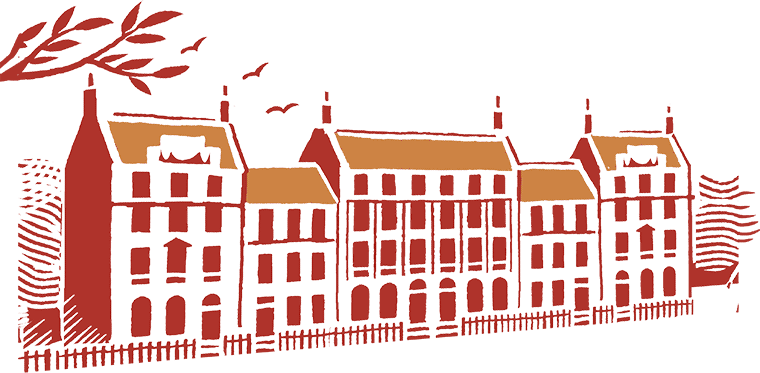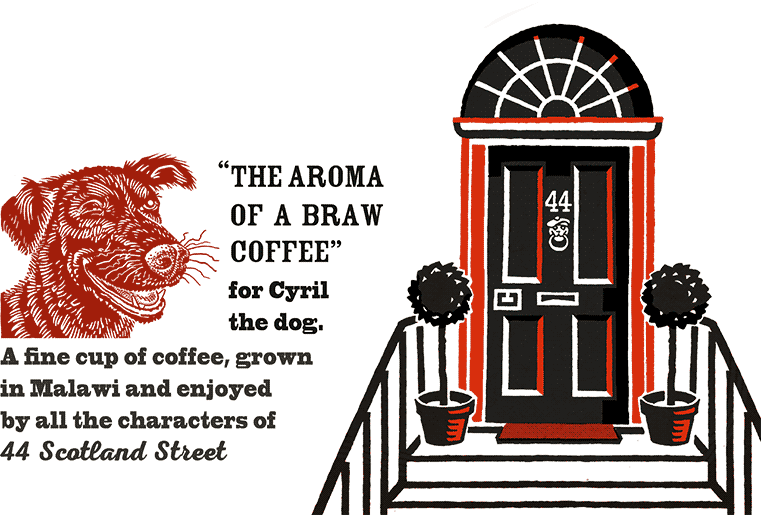Scotland Street Volume Two
Thinking about coffee, and the smell of coffee
By Alexander McCall Smith

Thinking about coffee, and the smell of coffee
“Proust,” said Angus Lordie, portrait painter, resident of Scotland Street, and father – as he liked to think of himself – of Cyril, a dog of indeterminate breed, well-known though in the environs of Drummond Place Gardens, Dundas Street, and the Cumberland Bar.
“Did you say Proust?” asked his wife, Domenica Macdonald, anthropologist, observer of humanity, and, at the moment at which Angus spoke, cook.
“I did,” he said. “Not as deliberately, perhaps, as I might say other things, but nonetheless I did say it. Proust. Marcel Proust.”
Domenica looked up briefly from the baking sheet onto which she was ladling cheese scone mixture. She made cheese scones that were relished by all those who ate them – indeed they were celebrated. The secret, Domenica had decided, was to get the right amount of cayenne pepper into the mixture. Cheese scones had to have a kick. Some people’s cheese scones had no more than a nudge; a good cheese scone had to have something more than that.
Only half-paying attention to Angus – after all, husbands said so many inconsequential things – Domenica asked him why he should suddenly say Proust. “It’s not that one can’t say Proust if one so desires,” she said. “Proust carries no opprobrium in that sense. Nor, I imagine, is the uttering of his name cathartic.”
Angus looked up from the kitchen table. It was a moment of comfortable domestic intimacy: he was sitting in the chair in which he always sat; Domenica was engaged in the baking that she so enjoyed; Cyril was asleep on the rug he regarded as his own; and the morning sun was streaming in through the window. Had a Dutch painter of the seventeenth century – one of those faithful recorders of such interiors – been there with them, he would undoubtedly have painted the view through the window as well. Dutch paintings are full of such views: a street observed through a doorway; a courtyard glimpsed through an open window; a child playing outside, watched from within.

Outside, of course, was Edinburgh – or a small slice of it: a street that descended sharply; slate-covered roofs; a seagull, mewing, perched on a disused chimney pot; a sky that stretched out towards Fife, punctuated by wisps of cloud on some high mission of their own; that Edinburgh light that proclaimed north. All that.
Angus explained. “I said Proust because I was thinking of him.”
Domenica sprinkled fragmented Parmesan over the tops of her scones. “A good enough reason,” she said. ‘But why think of Proust? Are you proposing to read him?”
Angus thought about this before he answered. “I’ve been planning to read Proust for a long time. I’ve read a bit – three volumes I think. But then I somehow get lost. I drift off. I drown somewhere along the line. All those endless social observations. All the detail about what the narrator was thinking as he did the most ordinary things.”
Domenica knew what he meant. “It must have been extremely difficult being Proust,” she said. “He couldn’t do anything – anything – without triggering an endless train of memories. Getting out of bed – the feel of the floor underfoot, the sensation of the wood floorboard, the walking along the corridor – the view from the corridor – the light at the end of the corridor – the door that brought the corridor to an end. All terribly complicated.”
“And yet that’s the way human memory works,” said Angus. “We don’t order our thoughts. One thought comes along, and then another that may have no bearing on what we were thinking of before. Imagine what a listing of the day’s thoughts would look like – a recorded stream of consciousness. Just imagine it.”
“In the case of some people,” said Domenica, putting on her disapproving Edinburgh voice, “it would make unsavoury reading.”
Angus laughed. “When I was a little boy, I used to imagine people without their clothes on. Did you ever do that?”
Domenica threw him a glance. “Girls don’t do that sort of thing,” she said. And then, “I take it you grew out of it?”
Angus looked rueful. “I did, I suppose. Yet it was a wonderful way of making the adult world less threatening. Remember, as children in those days, we were at the bottom of the heap. Adults were these stern, rather remote figures who ordered us about. If you questioned them they gave you a skelp.”
“So, your private revenge was to think of them en déshabillé?”
“Yes. It was very childish, but it worked. It cut them down to size – because nobody is frightening without any clothes. They’re just human – just like the rest of us.” He paused, and he thought of official pictures of those in authority, bedecked in the garments of office, medals, ribbons, chains, impressive hats. Strip all that away and you were back to the simply human.
Domenica steered the conversation back to the subject. That was the problem with conversations about Proust: they tended to wander.
“Why did you think of Proust if you aren’t reading him?”
Angus hesitated. It was not strictly true to say that he was not reading Proust; one was always reading Proust, one was only in remission in the reading of In Search of Lost Time. Few people reached the end, in the same way as very few people reach the end of Scott’s Waverley Novels: it was a long journey that one never actually concluded: the novels were always there in the background, reproachful, perhaps, waiting for the reader to return.
“I know somebody,” Angus said, “who carries Rob Roy round in his suitcase whenever he travels anywhere. He does so because he thinks this might just be the trip on which he gets around to finishing it. He’s hasn’t done so yet.”
“Don’t they say it’s better to travel hopefully than to arrive?”
Angus smiled wryly. “Yes. And perhaps it’s better to be reading Proust rather than to finish him.”
The cheese scones were now ready for baking. “In they go,” said Domenica, sliding the tray into the oven. “One gives hostage to fortune in making cheese scones. So many things can go wrong.”
“Your cheese scones are always perfect,” Angus assured her. “I can taste them already.”
She looked at him fondly. Domenica was not a sentimentalist, but a kind remark about cheese scones would melt ilka hairt. How fortunate I am, she thought, to have a husband to tell me how he admires my cheese scones. There are plenty of women who do not have that …
She sat down, dusting the flour off her hands. Some people washed flour off their hands; that was fundamentally wrong – one dusted one’s hands after using flour. That was what one did in Edinburgh. It was a small point, of course, but one might as well get it right.
“Proust,” she said.
“Yes, Proust. I said Proust because I was thinking about smell. Remember the scene with the madeleines?”
“Of course. Everyone knows about Proust’s madeleines.”
Angus gazed out of the window. “Eating a madeleine cake triggered memories of a visit to an aunt. But do you know something about those madeleines? It may be the most famous cake reference in literature, and yet I was reading somewhere that in an earlier draft they were toast and honey. Then, in a second draft they became biscotti, and only finally were they madeleines.”
“It wouldn’t have been the same,” said Domenica. “It’s hard to think of toast carrying such a weight of symbolism. A madeleine cake is much better at that sort of thing.”
Angus nodded. “Perhaps,” he said. “Of course, what Proust reminds us is that memory and smell – and taste, I suppose - are all very closely linked. Apparently that’s because the centres in the brain where these things are processed are very close together.”
“So, when you smell something, a memory can be triggered?”
“Exactly.”

They sat in silence for a while. Then Domenica said, “Coffee.”
“I’ll make it in a moment,” said Angus.
“No, I said coffee in the same way in which you said Proust.”
“Ah,” said Angus. And then he repeated, “Coffee.”
“You see?”
“Yes, I do. I said coffee, and a smell came into my mind.” He paused. “Can a smell come into one’s mind? Can you smell something without actually smelling it – if you see what I mean?”
“Domenica said that she thought she could smell coffee in the abstract, although, on reflection, she though that it was probably the memory of a smell rather than a smell itself.
“It’s such a wonderful smell,” said Angus. “There’s the smell of coffee and then there’s the smell of a new shirt when you take it out of the wrapping the first time and put it on. They’re both very special smells.”
“Evocative?”
“Yes, evocative.”
“Of what?” asked Domenica.
Angus had to think about this. Eventually he said, “Contentment. The smell of coffee is about contentment.”
She waited for him to explain further.
“When you smell coffee brewing – or even when you smell it on opening the packet – you feel … well, you feel somehow comforted. You know that for the next few minutes, whatever else is happening in your life, you’re going to be content. You’re not going to worry. You’re going to be thinking, but the thoughts you think will be pleasant ones – civilized ones.”
“And coffee brings with it conversations too,” observed Domenica.
“Yes, it does. Quiet conversations. Thoughtful conversations. Conversations that sound like a burn in the background – not a torrent – a burn.”
Angus stood up. “I shall make us coffee now. In gratitude.”
“In gratitude?” It seemed to Domenica at first that this was a strange thing to say. In gratitude for what? But then the answer came to her, and it came to her suddenly. Gratitude for everything.
She looked at Angus, at the man she loved, who was the man she was sure loved her back. “You know, Angus,” she said, ‘I think we might have just experienced a Proustian moment.”
“I think we have,” he said.
And then he said coffee – and she knew exactly what he meant.
© Alexander McCall Smith 2018.
LIST OF STOCKISTS:
- Allarburn Farm Dairy Creamery Edgar Road, Elgin
- Balgove Larder Strathtydrum Estate, St Andrews
- Bellfine High Street, Dunbar
- Blacketyside Farm Leven, Fife
- Brodie Countryfare Brodie By-Forres, Forres
- Brodies Newhailes Road, Musselburgh
- Coach House Coffee Shop Luss, Loch Lomond
- Deli Ecosse Ancaster Square, Callander
- Dollar's Delicatessen Bridge Street, Dollar
- Envelope & Bacon Barnton, Edinburgh
- Fine Scottish Hampers finescottishhampers.com
- Gairloch & Loch Ewe Action Forum Achtercairn, Gairloch
- Glendoick Garden Centre Glencarse, Perth
- Househill Farm Shop Househill Mains Farmhouse, Nairn
- Jenners Princes Street, Edinburgh
- John Kay's Victoria Street, Edinburgh
- Loch Leven's Larder Channel Farm, Kinross
- Manna Coffee Shop Newport-on-Tay, Fife
- Margiotta Dundas Street, Edinburgh
- People With A Mission Ministries Glasgow Road, Perth
- Raemoir Garden Centre Raemoir Road, Banchory
- Royal Botanic Gardens Inverleith Row, Edinburgh
- Scottish Seabird Centre The Harbour, North Berwick
- Simpsons Garden Centre Inshes, Inverness
- The Country Kitchen Deli Market Square, Melrose
- The Royal Millitary Tattoo Cockburn Street, Edinburgh
- The Smithy High Street, New Galloway
- Valvona & Crolla Elm Row, Edinburgh


